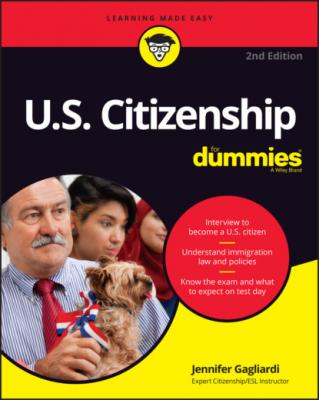U.S. Citizenship For Dummies. Jennifer Gagliardi
Чтение книги онлайн.
Читать онлайн книгу U.S. Citizenship For Dummies - Jennifer Gagliardi страница 17
 that you are a citizen, share this gift with others. Volunteer at your local adult school or community center and help people prepare for their citizenship interview. Find volunteer opportunities at
that you are a citizen, share this gift with others. Volunteer at your local adult school or community center and help people prepare for their citizenship interview. Find volunteer opportunities at www.volunteer.gov/s/.
We take freedom of religion seriously in the United States, which is why the USCIS allows the oath to be modified, or changed, in some cases, by leaving out these phrases:
“… that I will bear arms on behalf of the United States when required by law”: In order for these words to be left out of the oath, you must provide evidence that your objection to fighting for the United States is based on your religious beliefs and training.
“… that I will perform noncombatant service in the armed forces of the United States when required by law”: If you can provide enough evidence that your religious training and beliefs completely prohibit you from serving in the armed forces in any capacity, the USCIS will also leave out this portion of the oath.
“… so help me God”: If your religious beliefs keep you from using the phrase so help me God, the USCIS will omit the words.
“… on oath”: If you are unable to truthfully swear using the words on oath, the USCIS will substitute the phrase with solemnly affirm.
If you think you qualify to take a modified oath, you’ll need to write the USCIS a letter explaining why and send it along with your Application for Naturalization. Be aware that the USCIS will probably ask you to provide a letter from your religious institution explaining its beliefs and declaring that you are a member in good standing.
If you have a physical or mental disability that prevents you from communicating your understanding of the oath’s meaning, the USCIS will probably excuse you from this requirement.
Chapter 2
Meeting the Officials Who Can Help You on Your Quest
IN THIS CHAPTER
Before you start your journey on the path to immigration, knowing whom you’re dealing with is helpful. This chapter introduces you to the government agencies you may encounter and work with during the immigration and naturalization processes. Knowing the goals and missions of these government agencies can help you identify the ways they can impact you, as someone seeking lawful permanent residence or citizenship, and how to deal with them most effectively.
Understanding the Goals of the U.S. Immigration System
In 2002, Immigration and Naturalization Services (INS) was incorporated into the Department of Homeland Security (DHS) and INS functions were delegated to three separate agencies: U.S. Citizenship and Immigration Services (USCIS), Immigration and Customs Enforcement (ICE), and Customs and Border Protection (CBP). USCIS performs many of the duties of the former INS, focusing on immigration cases, including applications for work visas, asylum, and naturalization. (See the sidebar “A day in the life of USCIS” later in this chapter.)
On Presidents’ Day, 2018, USCIS updated its mission statement to reflect national security concerns and express the agency’s commitment to core values of integrity, respect, innovation, and vigilance, as follows:
“U.S. Citizenship and Immigration Services administers the nation’s lawful immigration system, safeguarding its integrity and promise by efficiently and fairly adjudicating requests for immigration benefits while protecting Americans, securing the homeland, and honoring our values.”
The U.S. immigration system works to achieve three main goals:
Bringing and keeping families together: U.S. immigration laws are designed to encourage families to stay together when possible. Immigrating through a family connection is the most common way people come to the United States.
Supplying a qualified workforce to keep the United States prosperin: Another of the USCIS’s duties is to help supplement the U.S. workforce by ensuring that there are enough foreign workers to fill positions not filled by U.S. workers.
Providing safe refuge and asylum: The USCIS also exists to help those who are seeking a safe refuge in the United States from political, religious, or social persecution in their home countries.
Identifying the Major Players and Their Roles in the Immigration System
A popular American expression with its origins in baseball, the country’s national pastime, says, “You can’t know the players without a score card.” And so it is with immigration. During the immigration and naturalization process, you’ll work with several government agencies. This section is your “score card” of the major players in the immigration game.
The Department of Homeland Security (DHS)
Effective January 24, 2003, the new Homeland Security Act represents the most significant and extensive transformation of the U.S. government in over 50 years. In the aftermath of the terrorist attacks against the United States on September 11, 2001, President George W. Bush decided 22 domestic agencies could better serve and protect the country if they were coordinated into one department. The new department reorganized a patchwork of government agencies under the authority of the Department of Homeland Security (DHS).
Counter terrorism and security threats
Secure U.S. borders and manage safe, orderly, and humane immigration processes
Secure cyberspace and critical infrastructure
Preserve and uphold the nation’s prosperity and economic security
Strengthen disaster preparedness and resilience
Champion the DHS workforce
One of the potential major advantages of the DHS is that it gives state and local officials one main